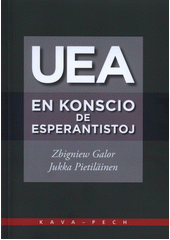Two new books, published with ESF support, debuted this year during the World Esperanto Congress in Lille, France: UEA en konscio de esperantistoj (“The World Esperanto Association in the consciousness of Esperantists”) by Zbigniew Galor and JukkaPietiläinen, and Gvidlibro tra Esperantio (konciza leksikono de la Esperanto-kulturo: esperantonimoj, realioj kaj flugilhavaj vortoj)(“Guidebook through Esperanto-land”) by Alexander S. Melnikov.
UEA en konscio de esperantistoj is a detailed sociological study of the Esperanto movement, one which builds upon and complements the sociological works by Peter Forster, Frank Stocker and Nicolas Rašić. The idea for this study was born during the 93rd World Esperanto Congress in Rotterdam, and surveys were begun during the World Esperanto Congress in Bialystok, Poland, the following year. The first part of the book presents the results of that quantitative study: it sketches a portrait of the respondents (all Esperantists) – their relationship with Esperanto culture, motivations for their interest in Esperanto, their opinions about the World Esperanto Association (UEA) and the World Congresses, their UEA membership (lapsed, renewed, type of membership), etc. The authors present a portrait of UEA from the perspective of SWOT analysis (analysis of strengths, weaknesses, opportunities and threats), and they comment upon the contradiction between the internal and external goals of the organization. The second part of the book looks at UEA’s image in a wider socio-ideological context: for example, they look into the relationships between Esperanto and socialism and capitalism, communication problems and ideology, and, lastly, linguistic imperialism. An impressive list of selected publications on the sociology of Esperanto completes the work.
Gvidlibro tra Esperanto is a popular reference book on aspects of Esperantists’ cultural life. It contains explanations of words and expressions common among members of the Esperanto movement, but which are difficult to understand outside of that context because they reference specific cultural characteristics of the Esperanto community. For example, the word “krokodilo” (“crocodile”) is defined as “an Esperantist who uses a national language within an Esperanto-speaking context” and “kabei” is “to act like [the Esperanto author] Kabe, who, having been a very active and eminent Esperantist, suddenly and completely left the Esperanto movement”. Common abbreviations for Esperanto organizations, descriptions of Esperanto phenomena (congresses, get-togethers, literary works, and titles of Esperanto periodicals), public figures in the Esperanto movement, and a multitude of other (sometimes rather esoteric) details are listed as well. The work is the fruit of several years of compilation and fills an important gap in the research literature on the Esperanto movement.
Both books are available through the UEA book service
UEA en konscio de esperantistoj. Zbigniew Galor, Jukka Pietiläinen. KAVA-PECH. Dobřichovice. 2015. 167 p. Price: 15.00 €. ISBN: 9788087169551.
Gvidlibro tra Esperantio. (konciza leksikono de la Esperanto-kulturo: esperantonimoj, realioj kaj flugilhavaj vortoj). Aleksandro S. Melnikov. Rostov-na-Donu. 2015. 527 p. Price: 39.00. ISBN: 9785986151472.




